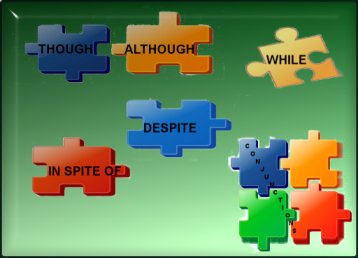| In spite of the pouring rain, | While he seems honest, | Much as I'd like to, | Although he was at the prom until midnight, | No matter how hard I tried to dissuade him, |
| the teacher caught him cheating on the test. | he didn't seem a bit tired on Friday morning. | Alex still put his hand into the alligator's mouth. | Lauren went outside without an umbrella. | I cannot go to the Coachella music festival with you. |
Were you able to figure it out?
Despite, no matter, and much as all introduce subordinate clauses, that is, clauses that
are secondary to the main clause in the sentence. Such words or phrases are typically called conjunctions,
conjuncts, disjuncts, and adjuncts. They can be single words despite, although, though, or while.
They can also be phrases such as in spite of, no matter or much as.
 Note: The only difference in meaning between despite and in spite of is that
the former is more formal than the latter.
Note: The only difference in meaning between despite and in spite of is that
the former is more formal than the latter.
So, what is the difference between conjuncts, disjuncts, and adjuncts? If you have been following the vocabulary lessons on roots and affixes in Wizard of Eng, then you may know the meaning of the prefixes ad-, con-, and dis-. They mean "to", "with" and "away" respectively. Look at the following examples.
- Adjuncts (they are placed into the sentence): Len usually goes home for lunch.
- Disjuncts (they are set apart (away) from the sentence): Honestly, I am disoriented.
- Conjuncts (they have a connecting function): If you go on smoking, then, I'm leaving.
In this lesson, we will concentrate on those conjunctions that show concession even though expectation or best efforts would suggest otherwise. The following three sentences illustrate concession.
- Despite dreaming about vampires, Felipe woke up with a smile on his face.
- No matter how many times she kissed the frog, Miyuki could not turn it into a prince.
- While Len certainly tried to run faster than Usain Bolt, in the end, he couldn't.
The following exercise should make this concept clear to you.

